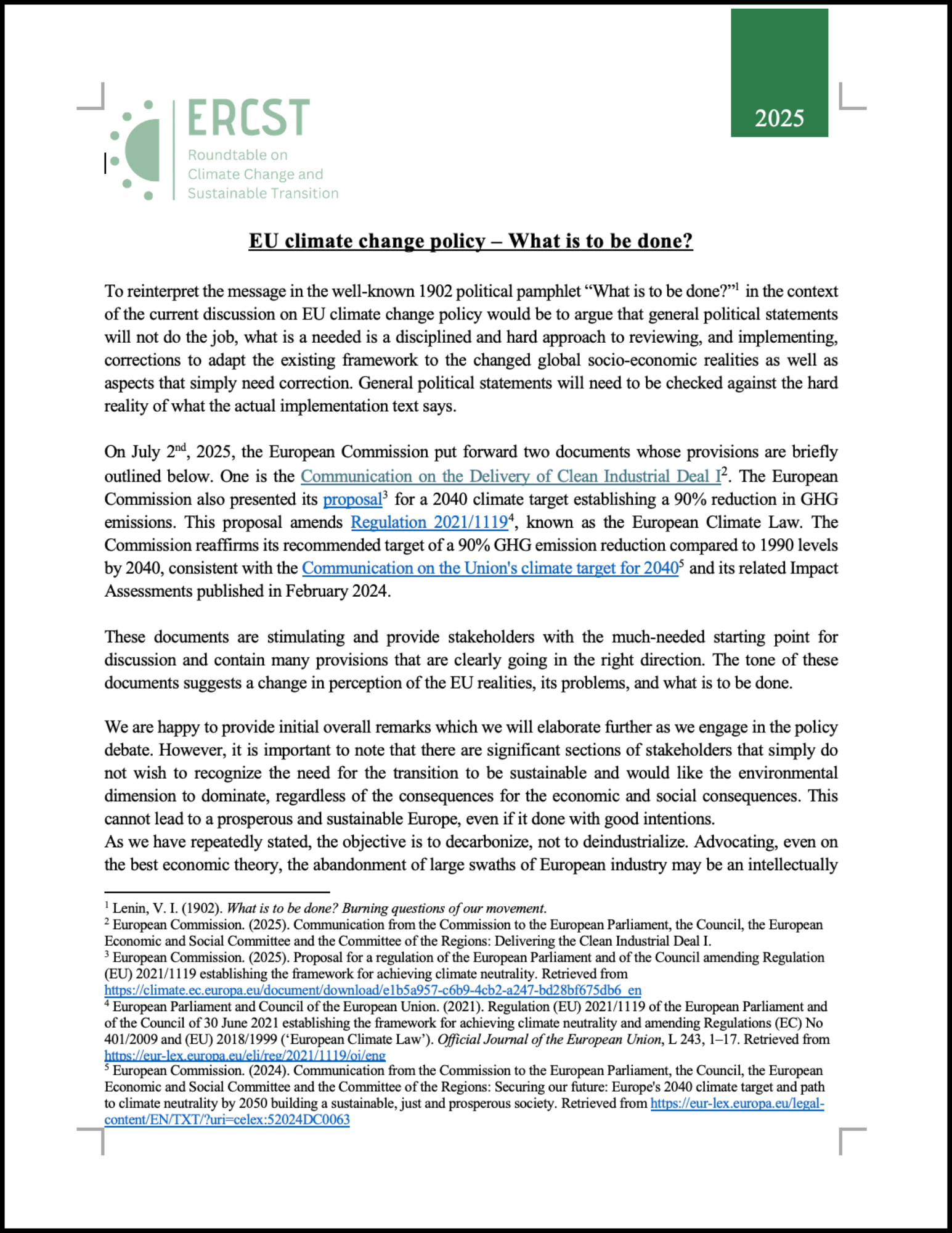Industrial Carbon Management: submission review
This was an in-person event. In 2023, CCUS and carbon removal technology are gaining considerable momentum in the European Union thanks to the new legislative proposals developed by the European […]
This was an in-person event. In 2023, CCUS and carbon removal technology are gaining considerable momentum in the European Union thanks to the new legislative proposals developed by the European […]
This was a public event under Chatham House rules – hybrid format. The ERCST workstream on “EU Climate Policy and Electricity Market” provides analytical input on the interactions between EU climate policy and electricity market. ERCST has developed a framework matrix (Annex 1) for analysing the elements of the EC proposal on electricity market reform through […]
This event occurred during the IETA North America Summit and Climate Week NYC at The Westin at Times Square New York - Room Gershwin 2 (4th floor). At this event, ERCST stocktaked on the role and importance of CCUS technologies and removals in achieving NDCs and net zero goals through international cooperation and political support. It […]
This was a hybrid meeting. The ERCST project seeks to evaluate EU policy pathways for decarbonizing heavy-duty road transportation and suggest new or complementary strategies aligned with the EU's climate neutrality goal. The first report set the ERCST analytical framework, assessing the factors shaping mobility decarbonization and identifying desired outcomes against the backdrop of evolving […]
This was an online event. The European Climate Law mandates a minimum 55% reduction in GHGs by 2030 from 1990 levels and targets Net Zero by 2050, prompting the European Commission to set a 2040 climate goal. An upcoming 2024 communication will assess the impact and address carbon removals essential for the "fit for 55" […]
This was a public hybrid event under Chatham House rules In the last consultation organised by ERCST, stakeholders identified a number of barriers to the uptake of renewable hydrogen. On the cost competitiveness side, renewable hydrogen in the EU still faces challenges in competing with hydrogen produced from fossil fuels, as well as with competing […]
This was an in-person event. The revised EU ETS Directive (EU) 2023/959 was adopted on 10 May 2023 and published in the EU Official Journal six days after. The European Commission now needs to update several regulatory acts for the revised EU ETS to be implemented in 2024. One important update concerns the Free Allocation […]
This was an in-person event. Scaling up CCUS and carbon removal technologies is essential for global climate neutrality by 2050, but their roles vary internationally. The EU’s ‘Net Zero Industry Act’ and related communications emphasize CCUS integration. Meanwhile, the U.S. has boosted the 45Q tax credit for CCUS and DACCS, and launched the 'COP28 Carbon […]
Following the CBAM regulation officially entering into force on the 17 May 2023, a number of delegated and implementing acts will determine some key details of the CBAM. One of these implementing acts will determine the detailed rules on the methods and process for crediting carbon prices paid in the country of origin. The ERCST […]
This was a public hybrid event under Chatham House rules. The ERCST's "EU Climate Policy and Electricity Market" workstream offers analytical insights into the interplay between EU climate policy and the electricity market, using a framework matrix for evaluating the EC's electricity market reform proposal from a climate perspective. In past discussions, ERCST examined how […]
This event was Hybrid. The ERCST project aims to analyse EU policy pathways for decarbonizing heavy-duty road transport, and propose, if necessary and appropriate, complementary and/or alternative policy pathways. They will be underpinned by the EU objective of climate neutrality stemming from the EU Climate Law. The project's first report established an analytical base, exploring […]
At the 28th meeting of the Conference of the Parties (COP28), discussions were set to build on topics from COP27 and the Bonn Conference, focusing on debates like reducing or phasing out fossil fuels, implementing the loss and damage fund, climate finance, and conducting the first Global Stocktake of the UNFCCC to review global progress […]

